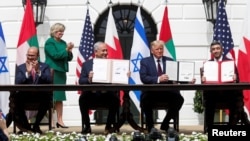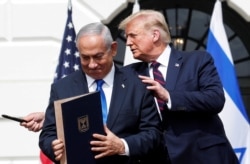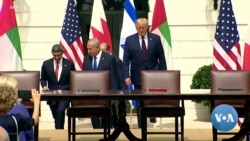U.S. President Donald Trump hosted a signing ceremony Tuesday at the White House for the normalization of relations between Israel and the Arab states of the United Arab Emirates and Bahrain.
“These visionary leaders will sign the first two peace deals between Israel and the Arab state in more than a quarter century,” Trump said. “In Israel's entire history there have previously been only two such agreements, now we have achieved two in a single month.”
Israeli Prime Minister Benjamin Netanyahu, UAE Foreign Affairs Minister Abdullah bin Zayed and Bahrain Foreign Minister Abdullatif bin Rashid al Zayani signed the so-called “Abraham Accords” on the South Lawn of the White House.
“This peace will eventually expand to include other Arab states, and ultimately can end the Arab-Israeli conflict, once and for all,” said Netanyahu.
The Israel-UAE deal was initially reached on August 13 between Israel and UAE, with Bahrain announcing last Friday that it will also formally recognize the Jewish state.
“We are witnessing today a new trend that will create a better path for the Middle East,” said Abdullah bin Zayed through an interpreter. He added that this new vision “is not a slogan that we raise for political gains” and that “peace is our guiding principle.”
Abdullatif bin Rashid al Zayani called the normalization agreement an “important first step.”
“It is now incumbent on us to work urgently and actively to bring about the lasting peace and security our peoples deserve,” he said. “A just, comprehensive and enduring two-state solution to the Palestinian-Israeli conflict will be the foundation, the bedrock of such peace.”
Middle East peace
While Trump did not mention the Palestinians in his remarks during the signing ceremony, he acknowledged that the normalization agreements between Israel and Arab nations was part of a broader diplomatic effort to pressure Palestinians into negotiating a peace deal.
“We've taken a very different path,” Trump said during a bilateral meeting at the Oval office with UAE’s Abdullah bin Zayed prior to the ceremony. “You could say it's a back door, but I call it a smart door.”
Gulf Arab countries had long conditioned full normalization of ties with Israel on it providing concessions and progress on the two-state solution, envisioning an independent Palestinian state alongside Israel.
But regional countries no longer think it's possible to use normalization with Israel as a bargaining chip to achieve the two-state solution, said Will Todman, associate fellow in the Middle East Program at the Center for Strategic and International Studies. Todman said the accord also reflects growing regional concerns about Iran and Turkey.
“Arab Gulf States and Israel have more in common in terms of their opposition to Iran than they have in opposition in relation to their views on Palestinian aspirations as stated,” Todman said. “I think that’s an important geopolitical shift.”
Israeli Prime Minister Netanyahu thanked the Trump administration for brokering the accords.
“You have boldly confronted the tyrants of Tehran, you’ve proposed a realistic vision for peace between Israel and the Palestinians, and you've successfully brokered the historic peace that we are signing today,” Netanyahu said.
No representatives from the Kingdom of Saudi Arabia or any other Gulf Arab states were present at the signing ceremony. But analysts say that UAE and Bahrain have likely secured the approval of the Saudis, a key player and U.S. ally in the region, before announcing normalization.
Palestinians condemn
Palestinian Prime Minister Mohammad Shtayyeh condemned the Abraham Accords, calling it “a black day in the history of Arab nations.”
Dana El Kurd of the Palestinian Policy Network think tank Al-Shabaka says the normalization deal between Israel and Bahrain is further evidence that Arab governments are abandoning the 2002 Arab Peace Initiative, without receiving “anything tangible related to the Palestinian cause or statehood project.”
Under the Abraham Accord with UAE, Netanyahu has agreed to halt plans to annex portions of the West Bank. But El Kurd said the annexation suspension means nothing on the ground.
“Annexation and the theft of Palestinian land continues unabated, as it did before the Israeli government pointed to a date in the calendar as ‘annexation’ day and will continue to do so after,” she said.
WATCH: Signing of "Abraham Accords"
Foreign policy wins
The Trump administration is touting the deals between Israel, UAE and Bahrain as key foreign policy victories with just two months remaining before the U.S. presidential election on November 3.
While foreign policy has not been a major election issue, the future of Israel matters to a key group of Trump supporters — Evangelical Christians, who made up about a third of his supporters in 2016.
Former U.S. Vice President Joe Biden, Trump’s Democratic opponent, said he supports more countries normalizing relations with Israel in response to a recent VOA question, but also said he believes “that Israel has to be prepared to work toward a genuine two-state solution” with the Palestinians.
A Trump administration official said the deal between Israel and UAE is smoothing the way for the U.S. to proceed with the sale of F-35 stealth fighter jets and other military weaponry. The prospect of the arms sale to UAE is raising concerns among some security experts as it could prompt Israel and other Middle East countries to also buy more weapons.









